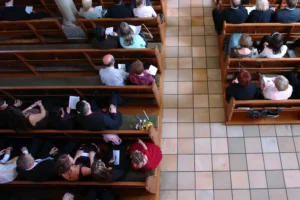I asked Peter, “Just what do you think love is?”
His forehead furrowed. “I guess luhvv would be —”
“Not luhvv. I asked about love.”
“What’s the difference?”
I sighed. “OK, start there. Tell me what you think luhvv is.”
“I’d say luhvv is warm, sweet, affectionate feelings.”
“I’d say that’s a very nice definition of luhvv.”
“Thanks. I guess.”
“What if I told you it doesn’t have much to do with love?”
“I’d be confused. But then, I am already.”
“You study the Holy Scriptures, Peter. Tell me someplace where they speak of love.”
“Um. ‘Love your enemies and pray for those who persecute you.'”Matthew 5:44. (All quotations RSV.)
“Do you suppose that means have warm, sweet, affectionate feelings for those who persecute you?”
“It doesn’t seem likely, Prof. Where are you going with that?”
“You’ll see. Where else do the Scriptures speak of love?”
“All over. Which passages do you mean?”
“One passage tells us to love God with all our heart, soul, mind, and strength.Mark 12:30. Is the mind the feelings? Does strength seem girlie?”
“No, but isn’t your heart the feelings?”
“You tell me. It’s true that the Bible uses expressions like yearning in the heart, fainting in the heart, and being sad in the heart. But it also uses expressions like thinking in the heart, speaking in the heart, hearing and receiving in the heart, being hardened in the heart, and even having writing in the heart.See for example Genesis 6:5, 24:45, 43:30, 45:26; Exodus 7:13; Psalm 14:1; Proverbs 3:3, 14:13; Ezekiel 3:10; and Romans 2:15. Do you think all that’s about feelings?”
“No. Sounds more like my heart is — well, me. Who I am deepest down. My core.”
“I agree. How about this? ‘Love never ends.’ Would you say that warm, sweet, affectionate feelings never end?”1 Corinthians 13:8.
“I’d say they can end pretty quick.”
“How about this? St. Paul says he wrote to the Corinthians ‘out of much affliction and anguish of heart and with many tears.'”2 Corinthians 2:4.
“Aren’t those feelings, Prof?”
“Certainly, but are they warm and sweet?”
“No. They’re yearning and suffering.”
“Exactly. How about this passage? Your namesake says —”
“My what?”
“You’re named Peter, aren’t you?”
Peter grinned. “I don’t think my parents were thinking of St. Peter when they named me. But what does he say?”
“To make every effort to supplement brotherly affection with love.’2 Peter 5,7. If affection has to be supplemented with love, Peter, doesn’t that tell you something?”
“You’re right. Love must be more than affection!”
“Just so. How about where St. John says, ‘This is love, that we follow his commandments”2 John 1:6. Would you say following God’s commandments is a feeling or a course of action?”
“A course of action. But what course of action?”
“You tell me. Paul says, ‘Walk in love, as Christ loved us and gave himself up for us, a fragrant offering.’Ephesians 5:2. What course of action is that?
“Giving yourself up for others.”
“Doesn’t that give you pause?”
“Should it?”
“Didn’t you complain that nothing in the sermon at your church made you want to go out and do hard things?”
“Yeah,” Peter said. “The minister —”
“Wouldn’t you call giving yourself up for others a hard thing?”
This time Peter did pause. “I’d call it the hardest.”
“How about where Paul advised the Thessalonians to ‘be sober, and put on the breastplate of faith and love, and for a helmet the hope of salvation’?”1 Thessalonians 5:8.
“I get you. You only put on a breastplate and helmet when you’re going to war. I guess that means spiritual war.”
“Depends on what you mean by calling it spiritual.”
“I mean we we’re not to use violence to convert people.”
“True, and that’s important. But to say that we’re speaking of spiritual warfare doesn’t mean we’re just talking about non-material acts that don’t involve our bodies.”
“Now you’ve really lost me, Prof. I would have said spiritual war just means stuff like resisting temptations.”
“It does mean that, but also much more. Haven’t you ever read the letter to the Hebrews?”
“When I became a Christian, I read through the whole New Testament, but I don’t remember that one.”
“Then I’ll let its author explain what I mean. ‘What more shall I say?’ he writes. ‘For time would fail me to tell of Gideon, Barak, Samson, Jephthah, of David and Samuel and the prophets — who through faith conquered kingdoms, enforced justice, received promises, stopped the mouths of lions, quenched raging fire, escaped the edge of the sword, won strength out of weakness, became mighty in war, put foreign armies to flight. Women received their dead by resurrection. Some were tortured, refusing to accept release, that they might rise again to a better life. Others suffered mocking and scourging, and even chains and imprisonment. They were stoned, they were sawn in two, they were killed with the sword; they went about in skins of sheep and goats, destitute, afflicted, ill-treated — of whom the world was not worthy — wandering over deserts and mountains, and in dens and caves of the earth…. Therefore, since we are surrounded by so great a cloud of witnesses, let us also lay aside every weight, and sin which clings so closely, and let us run with perseverance the race that is set before us, looking to Jesus the pioneer and perfecter of our faith.'”Hebrews 11:32-38, 12:1-2a.
“Wow. I must have read that passage. And I know I’ve read about those people. But somehow I never put it all together. They were heroes, weren’t they?”
“More than that, I’d say. They were a new kind of hero, unlike anything known to the pagan world. By the way, did you notice that the author of the passage mentions women too?”
“Yes, but they didn’t sound any girlier than the men did.”
“They weren’t. They were women of faith. The apex of Christian womanhood is womanly, but it isn’t girlie — any more than the apex of Christian manhood is.”
I gave him a few moments to take it all in. “Have I answered your question about whether Christianity is a girlie religion, Peter?”
“Yea-ahh,” he murmured hesitantly. “I guess so.”
“A moment ago you sounded convinced. What happened?”
“It’s just that I never see any of that heroism.”
“I suspect that there is a lot of heroism going on around you that you haven’t noticed.”
“Then why haven’t I seen it?”
“You have to know where to look.”
“It’s easy for you to say that.”
“But I’ve seen it, Peter, right there in ordinary life.”
“Just in ordinary life?”
“No. In other places, Christians still suffer mocking and chains and imprisonment.”
“You say in other places. Not around here.”
“Not at the moment.”
“What do you mean, not at the moment?”
I shrugged. “Does the world around here look to you as though it’s becoming more Christian?”
“No. Less. Every day, less.”
“That’s what I mean. Even when the times don’t seem to demand hard choices, you never know when you may be tried.”
“You mean, when you may have to put your life on the line?”
“Maybe your life; maybe something else. Your career. Your security. Your reputation.”
“But is Christianity still like that?”
“More Christians have been martyred in the last century than in all of the previous centuries put together.”
“Let me rephrase my question. Is Christianity still like that locally? Do I have to go where Christians are persecuted to find the real thing? When you asked whether the world around here looks as though it’s becoming more Christian and I answered ‘No,’ I wasn’t just thinking of the secular world. I was thinking of my own church. The gooey homilies, the touchy-feely praise music, the schlocky little pictures in the bulletin, the works.”
I laughed. “It did sound pretty repellant. And I won’t defend those things. I have three suggestions for you.”
“Please. I need them.”
“First, have more charity. About those schlocky little pictures in the bulletin: Art too can serve God, and I’m all for good taste. Even so, good taste isn’t one of the spiritual virtues. There must be many holy people who have bad taste. Surely you don’t imagine that those ladies in the church office who put together the bulletin are your spiritual inferiors.”
Peter looked uncomfortable.
“Peter! Have you been imagining —?”
“Um,” he said.
“Never mind; you get my point.”
“Yes,” he confessed.
“My second suggestion is to make distinctions.”
“Between what and what?”
“Between those things which are really harmful and those things which are merely annoying,” I answered. “The cute little pictures in the bulletin — you can live with those. The vapid, excessively sentimental music — that’s a good deal worse, because it encourages you to confuse the act of worship with the experience of certain emotions. The gooey preaching — that’s probably the worst, because it presents such a watered-down picture of what it means to follow the faith. Does that help put matters in perspective?”
“Yes, it does. Can I guess what your third suggestion is?”
“Why not?”
“You were going to say I should ask myself a question.”
I lifted my eyebrows. “As a matter of fact, I was.”
“I can guess the question, too,” he said.
“Tell me!”
“You were going to say that if Christianity seems girlie where I am, why don’t I go worship somewhere else?”
I rubbed my head. “Well, that’s not a bad question. I can certainly imagine circumstances in which that might be your best course of action. But you’re getting ahead of yourself. I think you should ask a different question first.”
“What question do you mean?”
“If Christianity seems girlie where you are, whose fault is that?”
“The minister’s?”
“Not just the minister’s. Where are all the men?”
“They’re right there.”
“That’s not what you told me. You said most of the people in the congregation were women, most of the men looked asleep, those who didn’t look asleep were looking at their watches. Why doesn’t anyone demand better from the minister? Why doesn’t anyone say, ‘Stop feeding us milk for babies; feed us solid food for spiritual men’? Could it be that not enough of you are man enough to want it?”1 Corinthians 3:1-2.
“That’s a good question. I don’t know.”
“You went on to say that most of the Sunday School classes in your church are taught by women, and most of the ministries are run by women. Could it be that your church is girlie because you’ve left everything to the women?”
“I don’t know that either.”
“By the way, where are you in all this, Peter?”
“What do you mean?”
“You said it all started when Nathan said Christianity was a girlie religion. That Sunday at your church, the worship was so girlie that you wondered if he was right. Instead of hyperventilating about girliness, why not have some manly zeal? Why not ask, ‘Well, I’m here, and I’m a Christian man, so —’?”
“Are you saying that in churches like mine, it’s us men who’ve dropped the ball?”
“Men have been dropping the ball throughout this society,” I said. “It wouldn’t be surprising if they’ve dropped it in churches too. We expect women to hold everything together without our help — then we blame them for trying!”
“Professor! What am I going to do about it?”
I grinned. “That’s the question.”
Copyright 2010 J. Budziszewski. All rights reserved.











